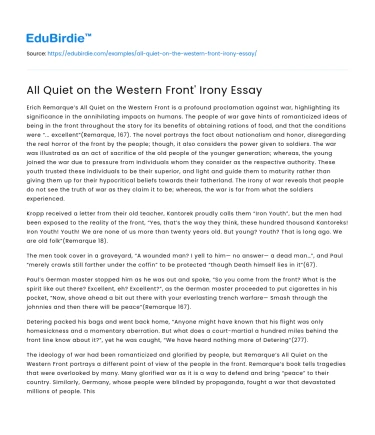Erich Remarque’s All Quiet on the Western Front is a profound proclamation against war, highlighting its significance in the annihilating impacts on humans. The people of war gave hints of romanticized ideas of being in the front throughout the story for its benefits of obtaining rations of food, and that the conditions were “... excellent”(Remarque, 167). The novel portrays the fact about nationalism and honor, disregarding the real horror of the front by the people; though, it also considers the power given to soldiers. The war was illustrated as an act of sacrifice of the old people of the younger generation; whereas, the young joined the war due to pressure from individuals whom they consider as the respective authority. These youth trusted these individuals to be their superior, and light and guide them to maturity rather than giving them up for their hypocritical beliefs towards their fatherland. The Irony of war reveals that people do not see the truth of war as they claim it to be; whereas, the war is far from what the soldiers experienced.
Kropp received a letter from their old teacher, Kantorek proudly calls them “Iron Youth”, but the men had been exposed to the reality of the front, “Yes, that’s the way they think, these hundred thousand Kantoreks! Iron Youth! Youth! We are none of us more than twenty years old. But young? Youth? That is long ago. We are old folk”(Remarque 18).
Save your time!
We can take care of your essay
- Proper editing and formatting
- Free revision, title page, and bibliography
- Flexible prices and money-back guarantee
The men took cover in a graveyard, “A wounded man? I yell to him— no answer— a dead man…”, and Paul “merely crawls still farther under the coffin” to be protected “though Death himself lies in it”(67).
Paul’s German master stopped him as he was out and spoke, “So you come from the front? What is the spirit like out there? Excellent, eh? Excellent?”, as the German master proceeded to put cigarettes in his pocket, “Now, shove ahead a bit out there with your everlasting trench warfare— Smash through the johnnies and then there will be peace”(Remarque 167).
Detering packed his bags and went back home, “Anyone might have known that his flight was only homesickness and a momentary aberration. But what does a court-martial a hundred miles behind the front line know about it?”, yet he was caught, “We have heard nothing more of Detering”(277).
The ideology of war had been romanticized and glorified by people, but Remarque’s All Quiet on the Western Front portrays a different point of view of the people in the front. Remarque’s book tells tragedies that were overlooked by many. Many glorified war as it is a way to defend and bring “peace” to their country. Similarly, Germany, whose people were blinded by propaganda, fought a war that devastated millions of people. This is the risk that people, those who were pressured or blinded by lies, took to serve their country.






 Stuck on your essay?
Stuck on your essay?

